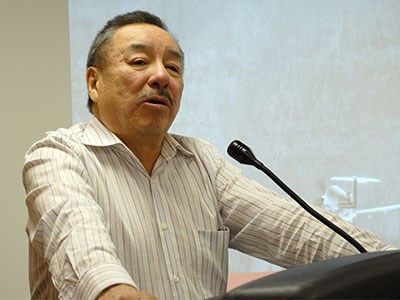Ontario Regional Chief Stan Beardy is confident that a new relationship is emerging with Queen’s Park following a summit late last fall designed to find common ground on key issues that will allow resource development to proceed in the Far North.
First Nation leaders from across Ontario met in late November for a “Leaders in the Legislature” event with Ontario cabinet ministers in Toronto to table Aboriginal priorities starting at the community level.
Beardy called the intensive three-day event “a step in the right direction” with a series of roundtables on resource benefits and revenue sharing, treaty awareness, health, education, infrastructure, economic development and missing and murdered indigenous women.
The chiefs matched their issues with the appropriate ministers based on their mandate letters from the premier.
Beardy said First Nations aren’t out to block resource development projects, but the law is on their side and must be allowed to participate and benefit from them.
With a number of Supreme Court decisions recognizing Aboriginal title to land – include last June’s Tsilhqot’in decision in British Columbia – Beardy said First Nations are taking a more proactive approach in discussing priority issues with government.
“The historic way of doing business was just to respond to their policies and legislation and say, we have a problem or please do it this way.”
This approach with Queen’s Park, he said, is about formulating a new relationship with more substantive discussions on foundational issues to come.
“That’s why we feel encouraged. Let’s see how far Ontario wants to be a leader in terms of addressing Aboriginal relations because they’re so critical. Without First Nation involvement under the duty to consult and informed consent – without that legal requirement – it creates economic uncertainty for international investors.”
Beardy said senior government needs to understand that the U.N. Declaration for Indigenous Rights is not as “aspirational document,” but a legal requirement under international law.
“I’m hoping that finally Ontario is beginning to realize that.”
The string of favourable court decisions for Aboriginal people, the withdrawal by Cliffs Natural Resources from the Ring of Fire, and the standstill in mineral development in the Far North definitely gives First Nations more leverage in negotiations.
“We made treaties a long time, and they’re still living documents. We said we would have peaceful coexistence side-by-side, and when we made treaties we made a commitment that we would share the lands and resources from time to time.
“We’re not talking or insisting on hand-outs, that was never the intent when we made treaties. When we talk about benefits, we wanted jobs and training for our people. We wanted to be in a position to capture economic spinoffs as well. Whatever is fair to both parties, that’s what we envisioned when we made treaties.”
Beardy doesn’t want the treaties to be re-opened and re-examined, but for government to respect the spirit of the agreement between two “sovereign nations.”
“We do have a great responsibility, not only to ourselves but the rest of Canada that we have to work toward creating that economic balance for all of us.”
If infrastructure is extended into the Far North to extract natural resources, that development must include connecting remote communities to reliable sources of power.
“We need a guarantee that we will benefit this time around. Over the last 100 and 200 years, there has been massive extraction activities and exploitation of our natural resources on our homelands and we’ve never benefitted.
“Going forward our people are educated and we understand what our legal, constitutional and international rights are, and we are telling the government you can’t do that anymore, you need to work with us now.”
That’s why he’s optimistic that this new “constructive” conversion with Queen’s Park on what First Nation challenges are, and what their common objectives are will eventually produce results.
“We feel it’s a very positive signal to be told, we’ll listen and work with you.”
Beardy said most of the discussions were conceptual in nature. He’s hopeful of more detailed talks with government later this year to find and achieve some early successes.




